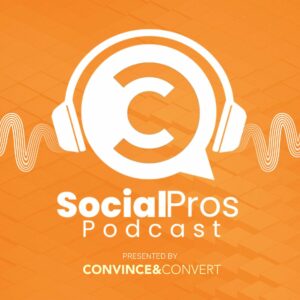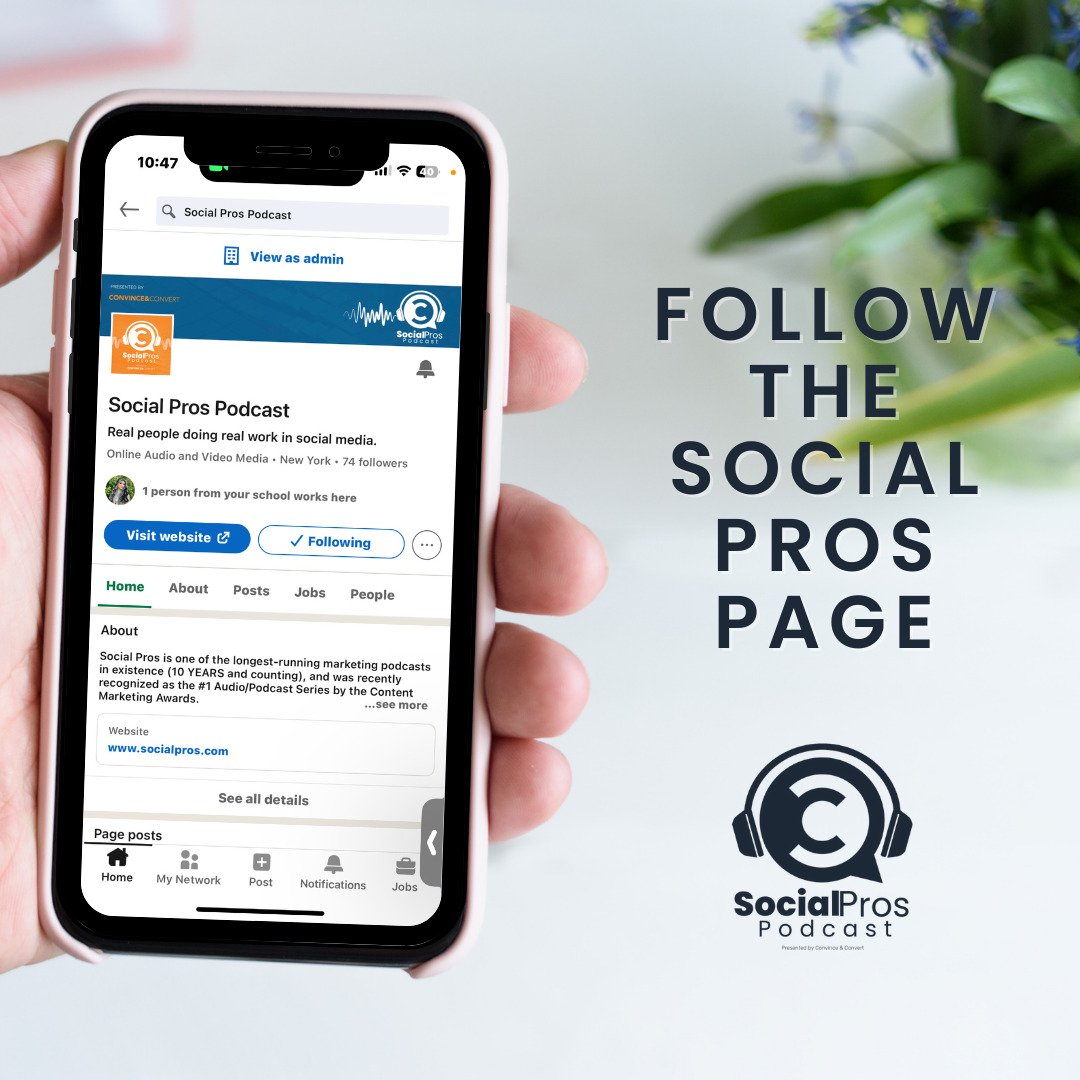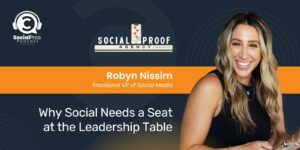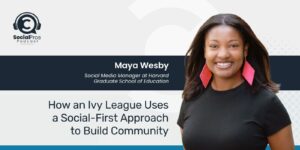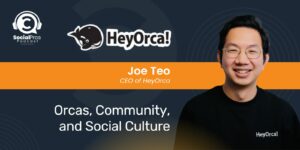Hosted By
About Social Pros Podcast:
Social Pros is one of the longest-running marketing podcasts in existence (10 YEARS and counting), and was recently recognized as the #1 Audio/Podcast Series by the Content Marketing Awards.
Our purpose? Making sure that we speak to real people doing real work in social media.
Listeners get inside stories and behind-the-scenes secrets about how teams at companies like Google, Reddit, Glossier, Zillow, Lyft, Marvel, and dozens more, staff, operate, and measure their social media programs. With 600+ episodes, the Social Pros Podcast brings the humanity of social media to the forefront, while providing incredibly useful marketing strategies that listeners can immediately implement.
Follow Social Pros on LinkedIn.
To inquire about becoming a guest or show sponsor, please email our Executive Producer, Leanna Pham, at leanna@convinceandconvert.com.
Apple Podcast Reviews:
The Social Pros podcast has quickly become a favorite in my feed! I'm consistently impressed by the engaging conversations, insightful content, and actionable ideas. I truly learn something every time I listen!
@Arlie KThis is absolutely an awesome listen for anyone in communications or social media!!
@Will31CThis podcast has become one of my staple weekly podcasts for learning about marketing! Love the conversations that they have and it's always enjoyable and educational!
@Simonstone95Love the podcast - informative, in depth and spot on for any business size.
@MissTriathlon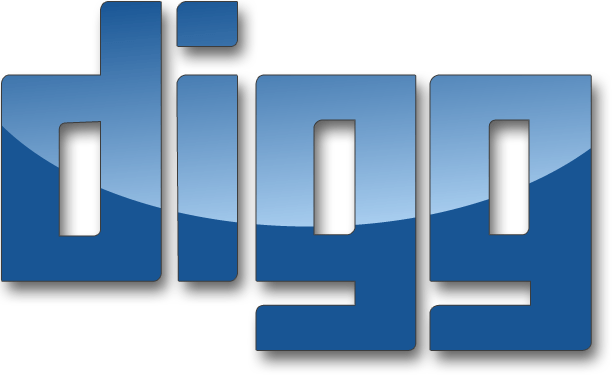
This is Episode 25 of the Social Pros Podcast : Real People Doing Real Work in Social Media. This episode features Alison Carlman of globalgiving. Read on for insights from Eric Boss & DJ Waldow’s Social Media Stat of the Week (This week: The Wall Street Journal reports more people are turning to YouTube as their news source). Listen Now […]
 This is Episode 25 of the Social Pros Podcast : Real People Doing Real Work in Social Media. This episode features Alison Carlman of globalgiving. Read on for insights from Eric Boss & DJ Waldow’s Social Media Stat of the Week (This week: The Wall Street Journal reports more people are turning to YouTube as their news source).
This is Episode 25 of the Social Pros Podcast : Real People Doing Real Work in Social Media. This episode features Alison Carlman of globalgiving. Read on for insights from Eric Boss & DJ Waldow’s Social Media Stat of the Week (This week: The Wall Street Journal reports more people are turning to YouTube as their news source).
Listen Now
Click the play button to listen here:
[podcast]http://socialpros.podbean.com/mf/web/jjneyx/SocialProsEpisode25.mp3[/podcast]
Download the audio file:
The RSS feed is: http://feeds.feedburner.com/socialprospodcast
Find us on iTunes: http://itunes.apple.com/us/podcast/convince-convert-blog-social/id499844469
Please Support Our Sponsors
Huge thanks to data-driven social media management software company Argyle Social for their presenting sponsorship, as well as Infusionsoft, Janrain, and Jim Kukral at DigitalBookLaunch. We use Argyle Social for our social engagement; we use Infusionsoft for our email; Janrain is our crackerjack social integration company, and Jim is our guest host for the podcast (and a smart guy).
Social Pros Transcript For Your Reading Enjoyment, Thanks to Speechpad for the Transcription
![]()
Eric Boggs: Hello again, everybody. Welcome to Social Pros Episode #25, the quarter century mark. I think it’s time for our quarter life-crisis here at the Social Pros Podcast. Today joining me is a special guest co-host, Mr. DJ Waldow. Mr. Waldow, hello-hello.
DJ Waldow: Special guest co-host, I’ve been called worse.
Eric: Yes, you got to earn just co-host and then you got to earn host after that. We like to be pretty meritocratic here at Social Pros.
DJ Waldow: Well, thanks for having me. I’m excited to… I don’t know how to follow that up.
Eric: Obviously our Grand Poobah, Mr. Jay Baer, is not on the call. I hope that you’ll continue listening because we have an awesome guest today. Jay is doing some travel for a client. He’ll be back next week with Number 26. Number 26 is Satmetrix’s, Richard, whose last name I’m not recalling, but it’s actually going to be very cool. It’s the same company that did the net promoter scores that kind of come up with a social media score that’s kind of parallel to that. So that’s coming up in Episode 26, when Jay is back in town.
Today in addition to DJ, we’ve got Alison Carlman, who is the un-marketing manager at globalgiving. She’s going to be joining us here in a bit. Alison is about as good as they come when it comes to social marketing for non-profits. She’s got some really good stuff to share based on her experience at globalgiving.
Before we get too much further, I will dutifully thank our sponsors which include; Infusionsoft, makers of small business marketing software; Janrain, the fantastic providers of Social Sign-On and Social Sign-On Functionality; Jim Kukral of Digital Book Launch, who is a frequent guest contributor to Social Pros, and also my beloved company Argyle Social, which I suppose is a little weird because I’m thanking myself, but so it goes.
DJ, we’ll start with kind of our topic of the week and we prepped this a little bit earlier today. Digg died this week, basically, I guess Digg died several weeks ago but like it officially died this week.

DJ Waldow: Yes, it sounds so morbid when you say it like that. I would say they sold or they got sold or they’re no longer Digg as we know it or as we knew it, but yes, I guess you could also say they’re dead.
Eric: It’s illiterative, and it’s more headline grabbing.
DJ Waldow: I think Stephen Covey died, that to me, that’s a little more real than Digg dying.
Eric: That’s true.
DJ Waldow: I digress.
Eric: That’s true. I usually record Social Pros with a 40 of OE and I’m actually pouring some on to the ground now for Digg and for Stephen Covey.
DJ Waldow: No comment.
Eric: So, you do bring up a good point. Digg, it’s more of like the demise of Digg. At one point, Digg was the poster child for Social Media and Web 2.0 and it kind of didn’t pan out, to speak specifically. DJ, you’re right, it actually was sold for pieces, it didn’t die. I guess Washington Post acquired the team for $12 million, LinkedIn acquired some patents for $4 million, and Beta Works acquired the, I think, the website and the brand for $500,000. In all total, that’s like $16 million, $17 million which is a fraction of just the investment capital that went into the company.
It’s a pretty sorted tale of a company that at one point was poised to take over the world and walked away from acquisition offers from Google that now has kind of been sold for scrap. There are a couple of lessons here that I want to tease out. One is wholly crap that seemed to happen really fast.
DJ Waldow: Yes.
Eric: Where you ever a Digger, DJ, or read it?
DJ Waldow: I have Dug or I did Digged, good luck transcribing that, I did at, I had in the past, I guess here and there but you know I guess I’ve always gotten my news from, not as much from the community but, more from my network of friends in my own community. For me Digg was never that community for me.
Eric: Yes.
DJ Waldow: In a sense.
Eric: Well, you’re kind of hitting on the, kind of the lynch pin, and I think the sort of the faltering of Digg and also sort of the lesson we wanted to tease out for this conversation is that you kept mentioning community. The story of Digg’s sort of down fall is beyond the scope of the 12-minute introductory conversation in Social Pros but the mistakes are really kind of around the fact that Digg wasn’t as community-focused as its competitors. It wasn’t as, like, a community-enabler in the same way that Twitter and Facebook have become.
DJ Waldow: Yes. Well, it’s interesting you mention that though because when I think of Digg, just the concept of Digg, I mean the idea is you’re basically pushing stories up to the top and then the most “popular” story is at the top. What’s interesting about your saying that is community but it’s not really. I mean there’s certainly a community aspect to that. I mean the community is voting. It’s almost like crowd-sourcing content. I mean the community votes on what’s the most relevant or important or news worthy event of the day. To me in a lot of ways, it’s kind of like newspapers, online newspapers that say “most e-mailed article of the day”
or “most viewed.” ESPN does that a lot, you know.
Eric: Yes.
DJ Waldow: The most viewed. I think where it faltered in the community aspect, now again, I haven’t been on Digg in years now, but I don’t remember them ever having the “my network,” “my community” voting. You know I could almost see it as having the overall Digg community and what they think and then what does DJ Waldow’s community think? What does Eric Boggs’
community think? I care more what you post than what the masses post, so to speak.
Eric: Yes. I think that was something like that. You know I wasn’t a huge user of the site myself but I think that, obviously, there was something missing there in terms of that relevance, also, just catering to the existing audience, right. Digg made a big technology change or big product change, I think in, like, 2010, and basically drove away all of their customers.
Everybody switched over to Reddit and ever since then it’s been sort of a downward spiral for Digg, and sunshine and lollipops for the Reddit community. I’m just kind of continuing to think about the parallels between this company and the job that social marketers have and community managers have.
It’s really that the product is the community. I know on this podcast we talk a lot about strategy. We talk about tools. We talk about tactics. We talk about big fuzzy ideas. But the asset is the community and the people that identify with your brand, or that identify with your idea or your conversation. If ever there was a cautionary tale, I feel like this is it.
DJ Waldow: Yes, it kind of speaks to what Jay talks about a lot in different presentations he gives on Convince and Convert, this idea of rented land. He’s always said that he’s a big fan of social media, Twitter, Facebook, and LinkedIn all these things are great.
But, it’s you’re putting content on somebody else’s land. It’s not your blog. It’s not your e-mail list. It’s not something that you have more ownership over. When that community goes away, if you were part of Digg and you were really a big Digg investor, so to speak not necessarily financially but you invested in it from a social aspect, it’s gone now. Where does that community go? It’s just been dispersed or displaced even.
Eric: Yes.
DJ Waldow: You have your own blog, if you have your own podcast let’s say, or your own e-mail marketing list, your community is more, I think stays with you no matter where you go.
Eric: Yes.
DJ Waldow: Perfect example, I mean, you and I have changed jobs several times.
Eric: Yes.
DJ Waldow: First of all, we’ve been friends through all of that and your community has stayed with you.
Eric: Yes.
DJ Waldow: I’ve been to a couple different jobs since, since Bronto back in the day, I would hope to think my community and network is expanding but it’s also stayed with me.
Eric: Yes.
DJ Waldow: Part of that is from an e-mail list, part of that is because of, if you want to get into the really fuzzy personal brand stuff, too.
Eric: Yes, that brings up a good point. There were, at the time, there was, I guess, the Digg effect, right? It was like getting an article on the first page of Digg would drive kajillions of page views. That could make or break your month as a marketer. That’s not there anymore, and you wonder if the parallel is investing in some other social network de jour today and whether or not that web property will be around for the long haul versus something like your e-mail list, or, even, I know we talk about Facebook and Twitter’s kind of rented property but at least they’ve reached critical mass, right. They’ve kind of gotten over the hump.
DJ Waldow: Yes but I would still say at the same time… If, this is the question you should always be asking yourself, I think, as a marketer. If Facebook does go away tomorrow or if Facebook changes their policies, which they do often as we know.
Eric: Yes, oh yes.
DJ Waldow: Or Twitter, if Twitter gets bought and the company that buys Twitter decides that it’s going to change them entirely, I mean, all these things are possible. I think the question you have to ask yourself is how dependent is your marketing strategy on platforms that you do not necessarily own.
Eric: Yes.
DJ Waldow: If those do go away and you notice that 80% of your traffic on your blog comes from sending out Tweets about it, well, that goes away, that channel goes away. Where do you get all your traffic?
Eric: Yes, tell me about it. That’s, yes, that’s, right on DJ, plus one. I think you just graduated to whatever the slightly better co-host title should be. You have that now.
DJ Waldow: Woo. I’m up for drinking a 40 now in celebration.
Eric: Yes, I mean, you’re exactly right. It’s a little bit akin to like, “Hey, I have a customer and that customer contributes 80% of my revenue on a monthly basis.” It’s like, that’s not a very good place to be. If your marketing strategy is tied up into sort of one channel or one platform, you know, you might want to think about broadening the base. DJ, what’s your Digg strategy, I guess, my closing question.
DJ Waldow: My Digg strategy is similar to my MySpace strategy, it sort of goes hand-in-hand. It’s at this point steer clear.
Eric: Yes, I’ll tell you and we’ll make sure there is a link in the transcript, but what got me thinking about this was not just that Digg, it kind of had its final nail driven in the coffin this past week, but there was a great article on slate.com about Digg, Flicker, MySpace, WinAmp. There was some other, like, thing that was a world beater at one point that has fizzled to irrelevance of late. I read all of them and they were fascinating to learn how all of these companies, basically, made just strategic mis-steps that at the time seemed to make sense to really smart people, but ultimately, kind of weren’t the right thing to do.
DJ Waldow: I think you have to remember too, it’s obviously that Monday Morning Quarterback, 20/20 hindsight and what other..
Eric: Oh yes.
DJ Waldow: …what other thing I could come up with that sounds like that and makes me sound smart. It is easy to look back on it and you could say well if I had sold at this point, you know, I don’t want to get specific into your own company, but, if there are offers to buy and it’s always a tough, it’s got to be, a tough decision. I mean looking back, should Digg have sold at the time, probably.
Eric: Yes.
DJ Waldow: But somebody comes in and offers Argyle Social a million dollars today and you say, “Well, $1 million. Wow.” I think Argyle is worth $10 million, it’s going to grow to $20 million. You know, you just know.
Eric: Yes.
DJ Waldow: I guess is the bottom line.
Eric: Well, I guess to kind of carry this point forward then we’ll hop over to the next piece of the show. The, sort of, theme amongst all of these, and these are companies like Digg that were independent throughout their whole life but also Flicker and MySpace that were acquired for kind of big money, is that there was a rampant decision to ignore the actual users and the community.
MySpace had ad revenue goals around it. Flicker was acquired by Yahoo purely as an image search strategy, not as like a social community of people that get value out of this website. It’s like these websites died because the people that ran them didn’t really value the community and try to empower the community.
Anyway, let’s keep moving on because we could keep talking about this for a long time. DJ, I know, I am certain, that you have a social media stat of the week.
DJ Waldow: This social media stat of the week is brought to you by… oh, maybe it’s not sponsored.
Eric: Yes.
DJ Waldow: OK. All right.
Eric: It’s brought to you by Argyle Social.
DJ Waldow: It’s brought you by Argyle Social. Yes. There’s a study out, it was, at least the one I’m reading, is from the Wall Street Journal and it talks about viewer’s are turning to YouTube as their news source. It was a study that came out of Pew Research Center project for “Excellence in journalism.”
It basically says, in 15 months, the most popular news videos on Google’s, YouTube owned site and basically found that people are getting their news from YouTube. I don’t know, my first take on this is, I think, my first reaction, well, no surprise.
Eric: Yes.
DJ Waldow: And mostly because, I don’t know if this stat is still true, but it used to be that Google or that YouTube was the second most searched site in the world.
Eric: It is. It is. Well, I don’t know, Bing is probably catching up but yes you’re right. At one point YouTube was the second biggest search engine on the planet.
DJ Waldow: Because of that alone, that does not surprise me. If you think about the millions of hours of video that are uploaded probably every day to YouTube and the amount of people that will watch stuff. I think one of the biggest reasons, and to me, one of the biggest take-aways they talked about in this article, events like the Japanese earthquake and tsunami were the most viewed and other like big events.
Eric: Yes.
DJ Waldow: I think part of the reason for that is that people like that a little bit, it’s like that, what was the show you speak of, America’s Funniest Home Videos.
Eric: Yes that was YouTube before YouTube.
DJ Waldow: Right but I mean to me that’s like people like to see, it’s very authentic and real and genuine. It’s not like a contrived.
Eric: Yes.
DJ Waldow: You know if you don’t believe in mass media it’s as real as it gets.
Eric: Yes. Yes.
DJ Waldow: I mean somebody filming on the streets watching the tsunami. I mean wasn’t it the crash in the Hudson was first captured in a picture on Twitter. You know, if somebody had videoed it I’m sure it would have been the most viewed on YouTube. You know the same kind of.
Eric: Oh yes.
DJ Waldow: So.
Eric: Oh yes, I’m actually, I’m, I Googled the article and I’m reading this stat now. A little, another funny little data nugget, more than a third of these most watched videos (on YouTube) came from citizens. And more than half came from news organizations but footage in those videos often included footage from citizens. That’s somewhat, exactly what you’re saying it’s that it’s people filming the news and uploading that to YouTube and that’s where we’re getting the story.
DJ Waldow: Well, I’d be interested to see how much of that, if this study is broken down somewhere to see how much of that is that CNN’s eye report. I know for a while that seemed to be like this big deal, you’d see somebody in the middle of a hurricane and they’re like filming themselves and they’re like DJ Waldow live from the hurricane in Florida. There’s like trees crashing down everywhere and you know, like, you get a lot of press because of that right.
Eric: Yes, oh geez that’s not very smart.
DJ Waldow: Yes, but again, this study, this stat, does not surprise me in any way, shape, or form but I think it does show in a lot of ways how far we’ve come, you know, if you think about mass media too, you know, the companies that are going to survive all this are going to be the ones that jump in. I’m not necessarily making a statement about CNN but the fact that they have been doing this Eye report thing for a long time.
Eric: Yes.
DJ Waldow: It tells me they’re at least, understanding the power of, going back to this conversation about community, and social media. They understand that connectedness that I think you need to have.
Eric: Yes. Citizen journalism, man, it’s the wave of the future. So, they tell me. Thank you very much D,J for the stat of the week, admirably done as someone who has presented most other social media stat of the weeks. You really did a good job there.
Special Guest: Alison Carlman, globalgiving

Eric: Let’s bring in Alison. Alison Carlman the un-marketing manager from globalgiving, our special guest for today. Are you still on Skype?
Alison: I’m still here.
Eric: Wow, we didn’t drive you away with all that inane banter. I’m so glad. Alison, thank you very much for joining us.
Alison: Yes. Good to be here.
Eric: Really excited to have you on the show. Can you introduce globalgiving, for the folks that may not know what the site is all about.
Alison: Sure. globalgiving is a non-profit organization and we are based in DC. We help find, vet and train non-profits to be part of our crowd funding platform, which is globalgiving.org. We help non-profits of all sizes from anywhere in the world to connect with donors of all sizes from anywhere in the world. Everything from $10.00 text to give donors, to corporate donors and corporate partners, can connect with any size of non-profit on our platform.
Eric: A very cool platform it is, Alison. DJ and I were talking during the prep, as I think you may have dialed-in and overheard the tail end of this. Both when DJ and I both worked at Bronto Software, I’m pretty sure I sold an e-mail marketing subscription to globalgiving and DJ is pretty sure that he was the account manager for the account. This is like a full circle realization.
Alison: It’s true.
Eric: Happening right now. Your title, Un-marketing Manager, can you tell us what that means?
Alison: Sure. Yes. The term un-marketing comes from a book by Scott Stratten, who has been a guest on the Social Pros podcast. It’s basically about the idea of primarily using social media to promote engagement around conversations from our projects on our website.
Eric: You had mentioned that you guys have kind of strategically focused your marketing around particularly social and engagement. Can you tell the story a little bit about how, maybe, the organization is changed in terms of it view of marketing since you’ve joined?
Alison: Yes. We’ve sort of walked away from the traditional marketing in the sense of having public relations, advertising agencies, buying lists of e-mails for new e-newsletters, and looking… Basically, the idea of marketing where your standing out at a sea full of people and, you know, throwing out hooks and hoping that somebody will grab and then share your story on their platform.
We moved away from that to more of an un-marketing (is the) idea where primarily using social media, we try on focus on building authentic relationships and customer experiences so that people want to tell their own stories about why their connected to the non-profits on our sites, then giving the non-profits on our sites tools to tell their own stories better. That’s a little bit maybe of a biased view on the difference between marketing and un-marketing but, yes, we’ve really walked more towards using social media as our primary venue for sharing stories about the non-profits on our site.
Eric: Do you find that you have to find a balance between sort of this un-marketing approach and — I mean do you guys do any sort of traditional paid marketing, paid advertising, or is almost 100% community driven engagement type stuff?
Alison: Yes. I have zero marketing budgets. Whenever I get these cold calls, it’s the easiest thing to say, “I have $0.00 to spend on advertising. We get Google grants for Google ad words and that’s it. But we do experiment a little bit, I think in the past year, we’re swinging a little bit, if we swung from marketing to un-marketing, maybe we’re swinging back a little bit to sort of do some thoughtful experiments in the marketing realm to see what works.
Eric: Yes.
Alison: For example, we’ve been trying out some of Facebook’s new promoted post.
Eric: Uh, yes, how is that working so far?
Alison: It’s been an interesting experiment. The idea of promoted post, a lot of people are opposed to. For the first promoted post we did, we said,”This is a promoted post we paid $50 for you to see this. What do you think about that?” People were, for the most part, irate. Some people were like, “Well, it’s your money,’ or some people were like, “Well, it’s my money, I don’t want you spending my money doing that.” I think it was interesting seeing, from like a social media ethicist, if you’re a social media purist you don’t like the idea that somebody can buy their way up edge rank.
Eric: Yes.
Alison: But if, you know, who says we all have to bow to holy EdgeRank in this situation, so, we decided let’s try it out, see what happens, we’ll do a few posst and see how it works for us. We’ve done I think three now so far and it’s been a really interesting experiment. I think partly because it is marketing. Like, we are buying our way into the conversation.
Eric: Yes.
Alison: But we’re marketing to our own kind, you know.
Eric: Yes.
Alison: We’re not going out to the big sea. We’re buying our way into the conversation of people who’ve already “liked” our page and who at one point said that they wanted to hear from us.
Eric: Yes.
Alison: We actually, in the couple posts that we’ve done, seen, of course, very high or much higher engagement rates and even surprisingly higher donation rates coming from Facebook and Twitter.
Eric: Oh wow.
Alison: Which doesn’t usually happen. Usually, it’s like a longer social funnel process of moving from engagement and then eventually to donations and we saw a pretty high number of direct-clicks on the post that became donations.
Eric: Oh wow. That’s very cool. DJ, what are your thoughts on that, buying your way into the conversation?
DJ Waldow: Well, it’s funny you mentioned value, your first Facebook post, sponsored post, you mentioned that. It was a conversation actually with Jason Falls and Scott Stratten, as it turns out, about automating social media content. I’d scheduled a post for the future, I think using Bluffer, Argyle or one of those services, Argyle. It was funny, when I wrote that, I basically said, “This post was scheduled to be sent at 9:30 a.m. on Tuesday,” just because. I think it’s interesting that you did that too, because I do think that there’s this feeling, especially in this social media community, that you know, god forbid you pay to get preferential treatment for something.
I guess my take is that if it’s working for you and your finding value out of it, I mean, I’m impressed the fact that you’re getting higher donations out of people from Facebook and Twitter, but in some ways it’s not totally surprising because they are people who are already interested in what you’re doing. It’s not like, it’s not cold calling, and you’re engaging your community.
Eric: Yes.
Alison: Yes. Well, I think it’s, you know, because we’ve had success doesn’t mean we’re going to do it all the time. Obviously that’s the un-marketer in me being like, “Wait only use it in emergencies.” You know, we will sort of look at our data and say OK when does this actually make sense to do this in a way that isn’t taking advantage of our fans and also, you know, is it a good use of our money because it would get expensive and, you know, even though we did see dollars coming back you may not always.
Eric: Alison you made a comment earlier about having no budget, which I imagine is a recurring theme for community managers that work for non-profits. Obviously you guys are doing pretty well with no, or very small budget. Do you have any sort of best practices or learning’s that you think are applicable for other non-profits that are operating on shoestrings?
Alison: Well, really the only money that I do spend besides on experiments like this with the Facebook promote posts, is on a software on Argyle, I am an Argyle client.
Eric: You have full disclosure, Alison is on this call because she is a customer and she had e-mailed me about something else.
Alison: We do spend money on a system through which we can post and monitor our, you know, conversations happening on social media. But for people with zero budget, I think there are ways to do that. I mean there are so many free…
Eric: Yes.
Alison: …tools out there. What the important is though you have to figure out what functionality you want and what you want to measure first before going, “Oh, this tool is really great.” You could spend hours and hours getting all this data and not know what to do with it.
Eric: Yes.
Alison: We have a big experimental philosophy here at globalgiving. One of our core values is listen, act, learn and repeat. It’s all about doing something, getting data from it, getting some feedback, changing your strategy and then moving on from there. I think if you decide on some key performance indicators beforehand, and this is what I need to find out from whatever my measurement processes are, then, you can use free tools to get that information.
Eric: Is the donation the key metric that you are trying to drive through social?
Alison: No. Well, I mean, it depends on what you mean by key.
Eric: Yes.
Alison: It depends on what you mean by key. It’s at the bottom of the social funnel, right, so that’s the goal is donations at the bottom but that is not actually my goal in a day to day basis.
Eric: Yes.
Alison: That’s one of the four things that I look at but everything else is more centered on the engagement that happens at the middle. I’m more interested in relationships with people and having people read our stories and then share our stories. That’s just as valuable to me because then when, say a disaster happens like when the Japan earthquake happened in 2010, or sorry, 2011 that’s when the people who were a part of tribe really rallied and shared our story. We became the tenth largest donor to Japan.
Eric: Yes.
Alison: Because we had built up that community.
Eric: Yes, that’s very cool. I imagine it has to be very rewarding to steward over a community that’s, has such a meaningful cause around it and such a strong purpose.
Alison: Yes. It’s so inspiring to see how many generous people there are out there whether it’s with their time or their energy or telling stories or whatever it is. It is a very inspiring place to work.
Eric: Very cool. Do you have some Social Pros shout-outs for us, per chance, Alison?
Alison: Well, sure, I do. Of course sort of the obvious here, for anyone who is in the non-profit social media world would be Beth Kanter, but if you’re not in the social media for non-profits world, then you should know about Beth Kanter anyway. She (Beth Kanter) spends a lot of time talking about how non-profits can measure social media success. She has a great blog and she’s just a great content carrier. I think her website is bethkanter.org.
Then another one would be my boss, Kevin Conroy, who is the brains behind this current version of the globalgiving website, he’s also in charge of our customer service and communications. He’s a programmer who also has all these different sides to his personality and is really great, and he runs a food blog called Make Better Food. So, that’s where you can find him.
Eric: I think that you’re the…
Alison: His target demographic is women ages 30-40 because all of his different, you know, on globalgiving that’s also our target demographic, so.
Eric: That is so brilliant that you gave a shout-out to your boss on the podcast, Alison. I can’t believe you’re the first one to do it. Like 25 episodes in and finally, like somebody is like, well done. Plus one Alison Carlman.
Alison: He’s the one that found the un-marketing title and made this brilliant job post that has lived on in infamy.
Eric: Awesome.
DJ Waldow: For the record, I thought you only got one shout out. I noticed there was Alison gave out two, is that kind of how it works?
Eric: Oh, no, two to three shout-outs is…
DJ Waldow: OK, I didn’t get that memo before, good, good to know.
Eric: That’s awesome, anything else, Alison?
Alison: Yes, one last thing. There are a lot of people who are working right now on a collaboration on coming up with some standards for social media measurement. Katie Paine is one of them but there’s a#smmeasurement, that you can follow on Twitter to keep up with that conversation. It’s sort of an on-going thing. I think mostly by PR people and communications people who are trying to figure out how we come up with some general international standards for how we measure social media.
Eric: Fascinating, that is another conversation. I have my own opinions around that. Anyway, I will save those for another time.
I’d like to give a Social Pros shout-out to Alison Carlman for joining us on the show today, and also, a Social Pro shout-out for the one and only Mr. DJ Waldow. Thank you very much DJ and Alison, for joining us. This is a lot of fun.
Alison: Yes, it was. Thank you.
DJ Waldow: Always, Mr. Boggs.
Eric: Yes, thanks for pitching-in in a pinch DJ. That’s it for Social Pros #25.
Thank you, as always, to our sponsors; Infusionsoft, Janrain, Mr. Jim Kukral, who is our usual guest contributor here when Jay or I are away, and also to my company Argyle. On behalf of DJ and Alison, thanks for listening, We’ll be back next week.
